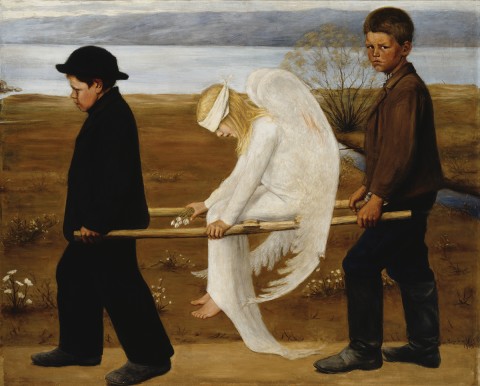Shane McCrae reimagines the life of a wounded angel
Poetry that continues the rich literary tradition of angels and offers a new, illuminating perspective

In The Wounded Angel, a 1903 painting by the Finnish artist Hugo Simberg, two boys carry a young angel on a stretcher. Bent, she holds onto the rails. Her forehead is bandaged; swipes of blood mark one of her wings. Her eyes barely peek from below the bandage as she stares at her bare feet (or at the ground). The image elicits intrigue more than horror. How did she get hurt? Who gave her the snowdrops that she holds in her right hand, their white flowers drooping toward the dirt road below? Why does the boy in the back look directly at us?
Any image of an injured child, let alone an angelic one, compels empathy. But this painting is disarming for a more prosaic reason. It depicts humans caring for an angel. Shouldn’t it be the other way around? Are angels not here, after all, to guard us? Mortals are in need of protection, not those closer to God.
While angels permeate popular culture, their biblical appearances are complex. Matthew describes how, right after Jesus drives the devil from the desert, “angels came and began to minister to Him” (4:11). In Mark’s version of the temptation story, while Jesus “was in the wilderness forty days being tempted by Satan,” he was also among “the wild beasts, and the angels were ministering to Him” (1:13). Matthew’s version seems more logical: the angels tend to Jesus after his spiritual test. Mark’s is more ambiguous and dramatic; we almost imagine the angels there with Jesus in the wilderness. They see his struggle.





